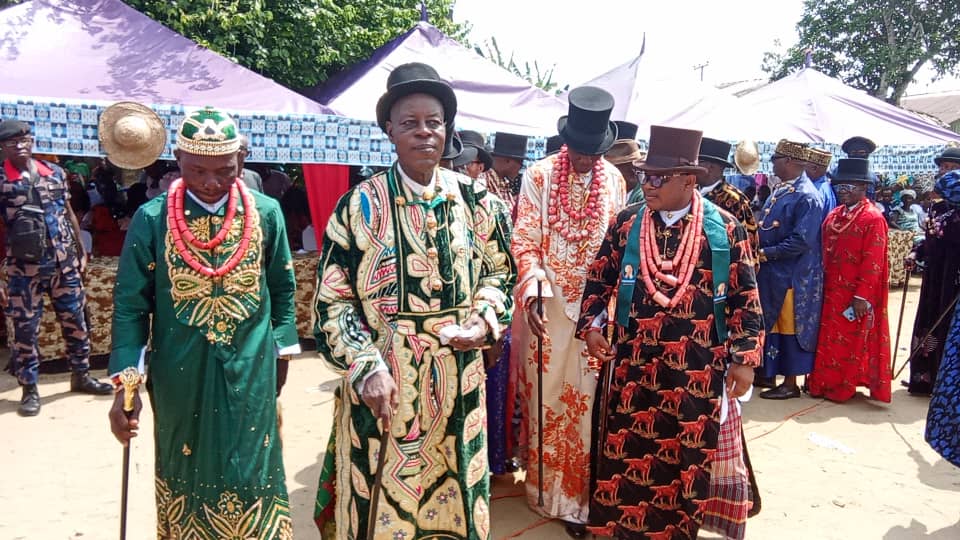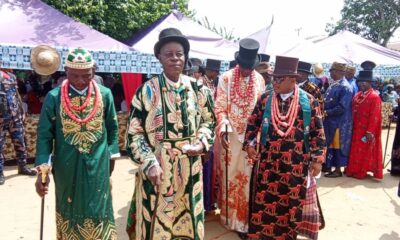News
IMF Board Begins Selection Process For New Managing Director

The selection process for a new Managing Director for the International Monetary Fund (IMF) has begun, its Board Coordinators have said.
The Board Coordinators of the Executive Board of the IMF, Mr Afonso Bevilaqua and Mr Abdullah BinZarah, made the disclosure in a statement made available to The Tide’s source, in Abuja, yesterday.
“We are very pleased to announce that the Executive Board has adopted an open, merit-based, and transparent process for the selection of the next Managing Director, similar to the one used in recent rounds.
“The executive board underscores the importance it places on the successful candidate having the requisite global standing to lead the fund, which stands at the centre of the global financial system.
“Individuals may be nominated by a fund Governor or Executive Director and as with past practice, we aim to reach a decision by consensus.
“The board intends to complete the process by the end of April 2024.”
The board coordinators said the board approved the decision as outlined below:
“The successful candidate for the position of managing director will have a distinguished record in economic policymaking at senior levels.
“He or she will have an outstanding professional background, will have demonstrated the managerial and diplomatic skills needed to lead a global institution, and will be a national of any of the fund’s members.
“As Chief of the fund’s staff and as Chair of the Executive Board, (s)he will be capable of providing strategic vision for the work of a high-quality, diverse, and dedicated staff.
“S(he) will be firmly committed to advancing the goals of the fund by building consensus on key policy and institutional issues, including through close collaboration with the executive board, under whose direction (s)he will fulfil his or her responsibilities.
“(S)he will have a proven understanding of the fund and the policy challenges facing the fund’s diverse global membership.”
According to the statement, S)he will have a firm commitment to, and an appreciation of, multilateral cooperation and will have a demonstrated capacity to be objective and impartial. (S)he will also be an effective communicator.
The statement said: “An individual may be nominated for the position of managing director by a fund governor or an executive director during a nomination period.
“This nomination period shall commence on March 14, 2024, at 12:01 a.m. Washington, D.C. time and will close on April 3, 2024, at 11:59 p.m. Washington, D.C. time.
“All nominations shall be communicated to the fund secretary, who shall obtain confirmation from each nominee of his or her willingness to be considered as a candidate.
“The fund secretary shall hold the names of the nominees in confidence until the end of the nomination period.”
It noted that:”At the end of the nomination period, the secretary shall disclose to the executive board the names of those nominees who have confirmed their desire to be candidates.
“If the number of candidates exceeds three, the executive board will keep the names of these nominees in confidence until it has drawn up a shortlist of three candidates, taking into account the above candidate profile without geographical preferences.
“The shortlisting process will be implemented through indications of which candidates receive the most support among directors, taking into account the fund’s weighted voting system.
“This is with the objective of completing the shortlisting process within seven days following the disclosure to the board of the candidates.
“Although the executive board may adopt a shortlist by a majority of the votes cast, the objective of the executive board is to adopt a shortlist by consensus. The shortlist shall be published by the fund.”
The statement adds: “The executive board will meet with the shortlisted candidates (or all of the candidates if there were fewer than four) in Washington, D.C.
“Thereafter, the executive board will meet to discuss the strengths of the candidates and make a selection.
“Although the executive board may select a managing director by a majority of the votes cast, the objective of the board is to select the managing director by consensus to complete the selection process by the end of April 2024 ,” it said.
News
Kano Gov Congratulates NUJ At 70

Governor Abba Yusuf of Kano State has congratulated the Nigeria Union of Journalists (NUJ) on its 70th anniversary.
The governor acknowledged the NUJ’s vital role in strengthening democracy and promoting accountability in governance.
This is contained in a statement by the governor’s spokesman, Sunusi Dawakin Tofa in Kano, yesterday.
The governor lauded the NUJ for its unwavering commitment to ethical journalism and nation building.
He commended the union’s leadership, led by Mr Alhassan Yahya Abdullahi, for advancing press freedom and advocating for journalists’ welfare.
“The NUJ has been instrumental in shaping Nigeria’s narrative, promoting democracy and ensuring accountability in governance.
”The Kano state government recognises the critical role of the media in our democracy and will continue to support and collaborate with the NUJ to uphold a free and independent press,” he stated.
Yusuf urged journalists to continue to uphold professionalism, integrity and objectivity.
He reaffirmed his administration’s commitment to fostering a strong partnership with the union, while ensuring that the media remained a pillar of democracy in the state and the country at large.
“Once again, congratulations to the NUJ on this remarkable achievement. May the next 70 years bring even greater successes and accomplishments for the union and its members,” he stated.
News
Monarch Lauds Fubara On Enduring Peace, Installs Three Chiefs In Ngo

The Village Head of Ngo in Andoni Local Government Area of Rivers State, King Dogood Ngere, has commended the Rivers State Governor, Sir Siminalayi Fubara, for his peaceful disposition and leadership qualities in the State.
King Ngere has also appealed to the governor and the Minister of the Federal Capital Territory, Nyesom Wike, to resolve their differences and work together for the interest of peace and development of the State.
The monarch stressed the need for the two leaders to put Rivers State interest above personal interest and reconcile their differences.
He said Fubara’s decision to implement the Supreme Court judgement shows that he is a man of peace and appealed to the Rivers State House of Assembly led by Rt Martin Amaewhule to work with the Executive to move the State forward.
The traditional ruler stated this shortly after he installed three chiefs at his palace in Ngo Town.
The three chiefs are Chief Daniel Dimkpa Nelson of Ebirien Ngere family, Chief John Biboh John of Ngor Egbesi family, and Awajimotumu Ukot Idawaji as chief of Ida Awaji family.
Addressing the new chiefs after their installation, King Ngere charged them to see themselves as role models for their individual families, stressing that as chiefs, it behoves them to be exemplary in their conducts.
According to the traditional ruler, the new chiefs must not only work for the peace of their families but Ngo community in general.
King Ngere also advised members of the three families to give their chiefs the desired respect while also supporting them to succeed.
He commended Governor Fubara for his numerous developmental projects in Andoni, particularly the ongoing Ngo/Oyorokoto Road, saying that when completed, the road will open up economic opportunities in the area.
Also speaking at the occasion, the Secretary of the Egweoke Council of Chiefs, Chief Awajiokan Mbosowo Ukumor, described the installation ceremony as a big success.
He said the three chiefs fulfilled all the conditions for their installation and are therefore admitted as members of the Ngo Council of Chiefs.
The ceremony was attended by people from various walks of life.
News
NDLEA Seizes Large Consignments Of Skunk, Heroin Across Six States, FCT

The National Drug Law Enforcement Agency (NDLEA) has seized large consignments of skunk, heroin, and other opioids in raids across Kano, Kwara, Kaduna, Taraba, Abia, Osun, and the Federal Capital Territory (FCT).
NDLEA’s Director, Media and Advocacy, Mr Femi Babafemi, disclosed this in a statement issued to newsmen in Abuja, yesterday.
Babafemi said that in Kano, a total of 727 blocks of compressed skunk weighing 479kg were recovered from a 40-year-old suspect.
According to him, the suspect was arrested by operatives of the NDLEA at the Chalawa area of the state on March 12.
He added that no fewer than 58,300 pills of tramadol were also intercepted along Kabba-Obajana highway, Kogi, in a commercial bus coming from Lagos, enroute Abuja on March 11.
He added that raid operations in Kachia, in Kaduna on March 13, led to the arrest of a 21 year-old suspect, with 4,900 pills of tramadol 225mg seized from him.
Babafemi said that a similar exercise in the Hayin Banki area of Kaduna North Local Government Area (LGA) on March 14, also resulted in the arrest of another 25-year-old suspect.
According to Babafemi, 2,900 tablets of tramadol 225mg was also recovered from him.
“A total of 40,200 tablets of tramadol 225mg were recovered from the duo of Olowoko Faruk and Akeem Ridwan along Ilorin – Jebba expressway, Bode Saadu, Kwara, on Friday, March 14.
“The NDLEA operatives equally seized 21,700 capsules of same opioid from a suspect, along Eiyenkorin expressway, Ilorin on Thursday, March 13.
“Also, in Taraba, NDLEA officers on Friday, March 14, another 30-year-old suspect, at Bente Road, Kurmi LGA, with 15.77kg of skunk,” he stated.
Speaking further, he noted that agency operatives had also on March 13 in Osun, intercepted a commercial bus with registration number, SGB 564 YS coming from Idumota, Lagos Island.
According to him, the NDLEA operatives recovered a total of 48.7kg Ghanaian Loud, Colorado and Canadian Loud, all strains of cannabis.
“Not less than nine suspects have been arrested in connection with the seizure in Osogbo and Ile-Ife during follow up operations.
“A 58-year-old suspect was on March 11, arrested along Gwagwalada expressway, Federal Capital Territory (FCT) Abuja, with 27,800 pills of tramadol 225mg.
“Another 26 year old suspect sold was nabbed same day with various quantities of skunk and cocaine at Wuse zone 3 area of Abuja.
“In Abia, NDLEA operatives had also on March 15, raided the Ntigha community, Isiala-Ngwa North LGA, where a 34-year-old suspect was arrested.
“Operatives recovered from him, 274grams of heroin, 141grams of methamphetamine, 2.931kg of cannabis sativa, four grams of cocaine and N753,015 monetary exhibit,” he said.
-
Opinion13 hours ago
Making Wise Decisions Amid Pressure
-

 News9 hours ago
News9 hours agoPower: Experts Want Review Of Privatisation
-

 Business12 hours ago
Business12 hours agoManufacturers Earn N494.2bn From Exports In Q4 2024
-

 Niger Delta8 hours ago
Niger Delta8 hours ago‘We‘ve Recorded Drop In Illegal Logging, Poaching’
-

 Maritime12 hours ago
Maritime12 hours agoAramalagu Keeps Tempo At Seme Border Command Nets N743.7m In One Month
-

 News7 hours ago
News7 hours agoMonarch Lauds Fubara On Enduring Peace, Installs Three Chiefs In Ngo
-
Politics13 hours ago
Group Tasks Senate On Fairness To Female Members
-
Sports9 hours ago
Arsenal Edge Chelsea To Stay 12 Behind

